情态动词表推测专项练习题
情态动词表推测

13.--He___ be in the classroom, I think. -No, he ___ be in the classroom. I saw him go home a minute ago. • A. can; may not • B. must; may not • C. may; can't • D. may; mustn't
情态动词表பைடு நூலகம்测 专练
Choose the correct answer.
1. — Excuse me. Is this the right way to the Summer Palace? — Sorry, I am not sure. It _____ be. A. might B. will C. must D. can
• 37.--Have you decide where to go for your summer vacation? • --Not yet. We ____go to Qingdao. It's good place for vacation. • A.may B.need C.must
38.---_____bookcase is this? ---It must be_____. A.Who's; Tom BWho's; Tom's C.Whose;Tom's D.Whose;Tom
• 29. If you__go,at least wait until the rain stops. • A.can B.may C.must D.will • 30.Thexre’s one day to go.You_____finish your schoolwork by tomorrow. • A.can B.will • C.must D.might’t
高二英语情态动词推测用法练习题30题
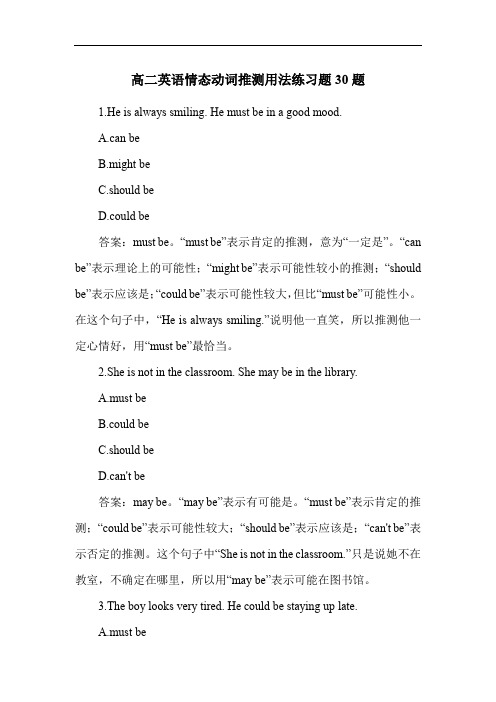
高二英语情态动词推测用法练习题30题1.He is always smiling. He must be in a good mood.A.can beB.might beC.should beD.could be答案:must be。
“must be”表示肯定的推测,意为“一定是”。
“can be”表示理论上的可能性;“might be”表示可能性较小的推测;“should be”表示应该是;“could be”表示可能性较大,但比“must be”可能性小。
在这个句子中,“He is always smiling.”说明他一直笑,所以推测他一定心情好,用“must be”最恰当。
2.She is not in the classroom. She may be in the library.A.must beB.could beC.should beD.can't be答案:may be。
“may be”表示有可能是。
“must be”表示肯定的推测;“could be”表示可能性较大;“should be”表示应该是;“can't be”表示否定的推测。
这个句子中“She is not in the classroom.”只是说她不在教室,不确定在哪里,所以用“may be”表示可能在图书馆。
3.The boy looks very tired. He could be staying up late.A.must beB.might beC.should beD.can't be答案:could be。
“could be”表示可能性较大的推测。
“must be”表示肯定的推测;“might be”表示可能性较小;“should be”表示应该是;“can't be”表示否定的推测。
这里“The boy looks very tired.”只是看起来累,所以用“could be”表示可能熬夜了。
情态动词表推测专项练习题
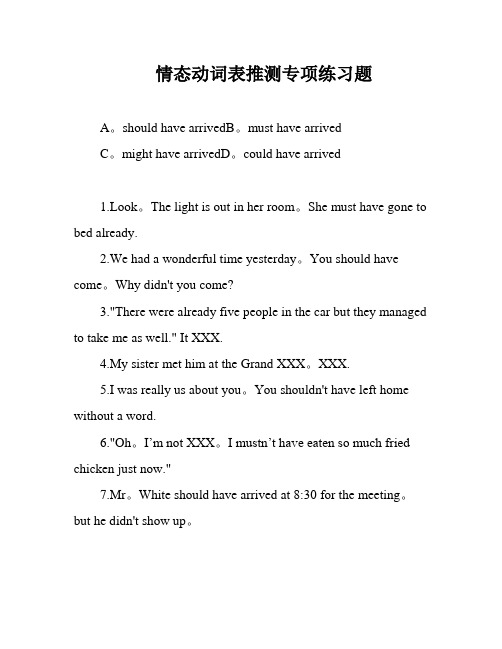
情态动词表推测专项练习题A。
should have arrivedB。
must have arrivedC。
might have arrivedD。
could have arrived1.Look。
The light is out in her room。
She must have gone to bed already.2.We had a wonderful time yesterday。
You should have come。
Why didn't you come?3."There were already five people in the car but they managed to take me as well." It XXX.4.My sister met him at the Grand XXX。
XXX.5.I was really us about you。
You shouldn't have left home without a word.6."Oh。
I’m not XXX。
I mustn’t have eaten so much fried chicken just now."7.Mr。
White should have arrived at 8:30 for the meeting。
but he didn't show up。
1.It seems that the person has already gone to bed。
so the correct answer is "must have gone".2.The speaker had a great time and expected the other person to come as well。
so the correct answer is "should have come".3.XXX because there were too many people in the car。
初中英语情态动词表推测练习题
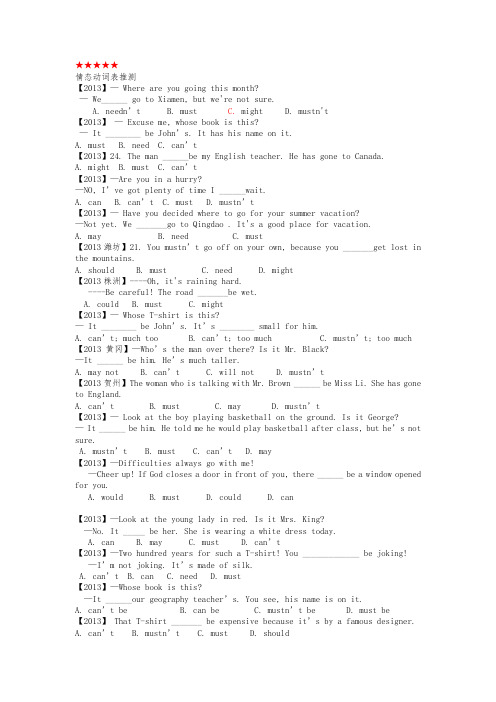
★★★★★情态动词表推测【2013】— Where are you going this month?— We______ go to Xiamen, but we're not sure.A. needn’tB. mustC. mightD. mustn't【2013】— Excuse me, whose book is this?—It ________ be John’s. It has his name on it.A. mustB. needC. can’t【2013】24. The man ______be my English teacher. He has gone to Canada.A. mightB. mustC. can’t【2013】—Are you in a hurry?—NO, I’ve got plenty of time I ______wait.A. canB. can’tC. mustD. mustn’t【2013】— Have you decided where to go for your summer vacation?—Not yet. We _______go to Qingdao . It's a good place for vacation.A. mayB. needC. must【2013潍坊】21. You mustn’t go off on your own, because you _______get lost in the mountains.A. shouldB. mustC. needD. might【2013株洲】----Oh, it's raining hard.----Be careful! The road _______be wet.A. couldB. mustC. might【2013】— Whose T-shirt is this?—It ________ be John’s. It’s ________ small for him.A. can’t; much tooB. can’t; too muchC. mustn’t; too much 【2013 黄冈】—Who’s the man over there? Is it Mr. Black?—It ______ be him. He’s much taller.A. may notB. can’tC. will notD. mustn’t【2013贺州】The woman who is talking with Mr. Brown ______ be Miss Li. She has gone to England.A. can’tB. mustC. mayD. mustn’t【2013】— Look at the boy playing basketball on the ground. Is it George?—It ______ be him. He told me he would play basketball after class, but he’s not sure.A. mustn’tB. mustC. can’tD. may【2013】—Difficulties always go with me!—Cheer up! If God closes a door in front of you, there ______ be a window opened for you.A. wouldB. must D. could D. can【2013】—Look at the young lady in red. Is it Mrs. King?—No. It _____ be her. She is wearing a white dress today.A. canB. mayC. mustD. can’t【2013】—Two hundred years for such a T-shirt! You _____________ be joking!—I’m not joking. It’s made of silk.A. can’tB. c anC. needD. must【2013】—Whose book is this?—It ______our geography teacher’s. You see, his name is on it.A. can’t beB. can beC. mustn’t beD. must be 【2013】 That T-s hirt _______ be expensive because it’s by a famous desi gner.A. can’tB. mustn’tC. mustD. should【2013】—Someone is knocking at the door. Is it Ann?—It ______be her. She is giving a performance at the theater now.A. mayB. mustC. can’tD. mustn’t【2013】—Is that girl Susan?— It _________ be her. She left for Beijing yesterday.needn't B. can't C. mustn't【2012】—Do you have any plans for this weekend?—I'm not sure. I ______ go climbing Mount Yuntai.A. mustB. needC. mayD. can【2012】“Whose notebook is this?”“It _______ Jim’s. It has his name on it.”A. can’t beB. must beC. can be【2012鸡西市】—Is that your teacher?—That _____be Mr.Wang. He has gone to Japan with his wife.A.can’tB. mustn’tC. may not【2012】—Who is that?—It _____ be Shirly. Only she is in red today .A. couldB. mayC. must【2011】—Is that girl under the tree Mary?—No, that ______be Mary. She is in New York.A. canB. mustn’tC.can’t【2012 】Is Maria knocking at the door?It ______be her. She is in Australia now.A. may notB. needn'tC. mustn'tD. can't【2012】-You _____ be happy with the strong public support you’ve received.-Yes, you’re right. I’m really excited.A. mayB. canC. mustD. need【2012】—My brother won the first prize in speech competition. —Congratulations! You ______be excited about that.A. needB. mustC. wouldD. can【2011株洲】That man ______ be my English teacher. He has gone to Canada.A. needn’tB. mustn’tC. can’t【2012】—Meng Fei had his arm broken while recording If You Are the One in Beijing. —Really? Then perhaps he _____host TV programs for some time.A. needn’tB. mustn’tC. shouldn’tD.can’t【2012】----Have you decided which senior high school to choose?-----Not yet. I ______ go to Moonlight School.A. mustB. mayC. needD. should【2012】The lady in this photo ______be over fifty! She looks so young!A. mustn’tB. mustC. can’tD. can【2012 】—You ______be excited that you’re going back to your hometown soon. —Yes, I can’t wait any longer.A. shallB. canC. needD. must【2012】— Excuse me, when are we going to have a picnic?—I’m not sure, Ask our monitor, please. He ______ know.A. needB. canC. mayD. shall【2012 】—Whose is the pencil box?—It______ be Tom's. Look at his name on the cover!A. canB. mayC. mustD. need【2012】This toy Mickey Mouse _______be Amy's. she’s the only kid at the picnic.A. mustB. canC. needD. can't【2012】—Look! The man at the gate ______ be our teacher. He is always standingthere every morning.—No, it _______ be him. He is having a meeting in the office now.A.must; can’tB. must; mustn’tC. can’t; can’t【 2012】—Excuse me, whose Japanese book is this?—It ______be Tom’s. In our class, only he is studying Japanese.A.mustB. can’tC. would【2012凉山】— Is Jim coming by train?—I’m not sure. He_____ drive his car.A. mustB. mayC. need【2012】—Whose shoes are these?—They _____ be Mike’s. They are much too large for him.A. mightB. mayC. mustn’tD. ca n’t【2012】—Look! A book is on the floor. Whose is it?—It ______be Rick's. It has his name on it.A. mustn'tB. can'tC. mustD. need★【2012】In competition, as in life, you _______ not always win.A. mayB. shallC. must【2012】 ---Have you heard that some bad thing would happen in 2012?--Don't worry! The news _________ be true.A. mustn'tB. may notC. needn't【2012】You ____be serious! You’re actually going to lend him money again?A. needn'tB. can'tC. shouldn'tD. mustn’t情态动词表推测用法总结及专项练习1.can / could用于表推测的用法(1) 从使用句型上看,can 通常只用于否定句或疑问句,一般不用于肯定句,而could 可用于肯定句、否定句和疑问句。
高考英语情态动词推测运用练习题20题

高考英语情态动词推测运用练习题20题1.He is always reading books. He must be very interested in literature.A.mustB.mayC.mightD.could答案:A。
“must”在这里表示肯定的推测,语气最强。
他总是在读书,所以一定对文学很感兴趣。
“may”“might”“could”虽然也可以表示推测,但语气较弱,不符合这里的语境。
2.She has a lot of knowledge about art. She could be an art major.A.mustB.mayC.mightD.could答案:D。
“could”在这里表示比较委婉的推测。
她有很多关于艺术的知识,有可能是艺术专业的。
“must”语气太强硬,“may”“might”也可以表示推测,但不如“could”委婉。
3.The man is wearing a suit and tie. He might be going to a formal event.A.mustB.mayC.might答案:C。
“might”在这里表示比较弱的推测。
这个男人穿着西装打着领带,可能是要去一个正式的活动。
“must”语气太肯定,“may”“could”也可以表示推测,但“might”更符合语境。
4.The room is very clean. She may have cleaned it.A.mustB.mayC.mightD.could答案:B。
“may”在这里表示有可能的推测。
房间很干净,她有可能打扫了。
“must”语气太强硬,“might”“could”也可以表示推测,但“may”更符合语境。
5.There are many books on the desk. He could be a student.A.mustB.mayC.mightD.could答案:D。
初中英语情态动词表推测练习题
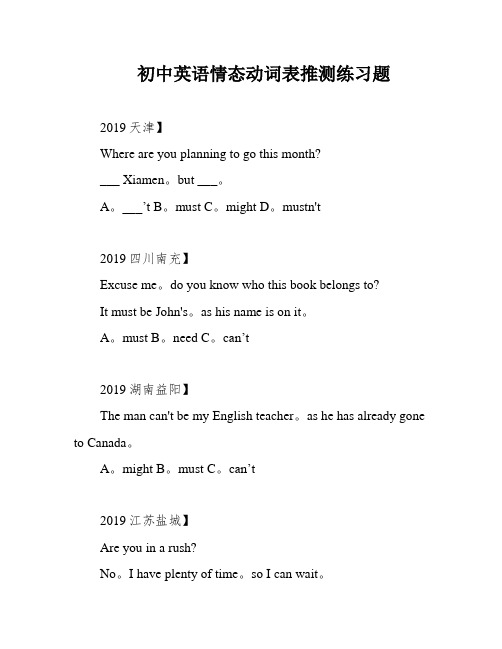
初中英语情态动词表推测练习题2019天津】Where are you planning to go this month?___ Xiamen。
but ___。
A。
___’t B。
must C。
might D。
mustn't2019四川南充】Excuse me。
do you know who this book belongs to?It must be John's。
as his name is on it。
A。
must B。
need C。
can’t2019湖南益阳】The man can't be my English teacher。
as he has already gone to Canada。
A。
might B。
must C。
can’t2019江苏盐城】Are you in a rush?No。
I have plenty of time。
so I can wait。
A。
can B。
can’t C。
must D。
mustn’t2019福建泉州】Have you decided where to go for your summer n?Not yet。
We may go to Qingdao。
as it's a great n spot。
A。
may B。
need C。
must2019山东潍坊】You mustn't go off on your own。
as you might get lost in the mountains。
A。
should B。
must C。
need D。
might2019湖南株洲】Oh。
it's raining ___.Be careful。
The road might be wet。
A。
could B。
must C。
might2019黑龙江绥化】___?It can't be John's。
as it's too small for him。
情态动词表推测练习
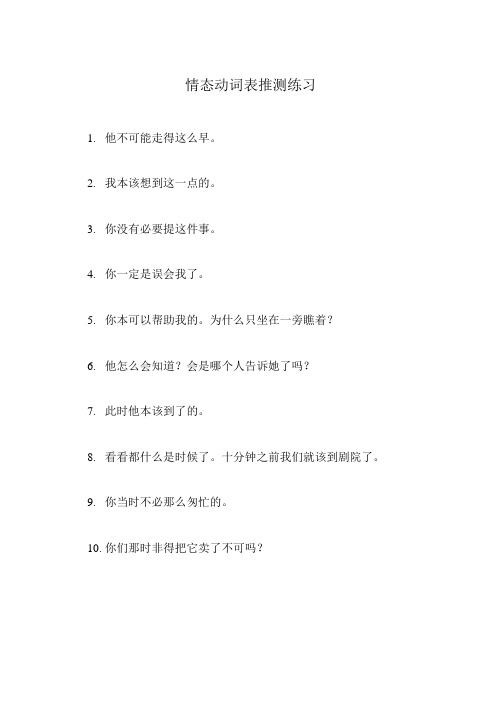
情态动词表推测练习
1.他不可能走得这么早。
2.我本该想到这一点的。
3.你没有必要提这件事。
4.你一定是误会我了。
5.你本可以帮助我的。
为什么只坐在一旁瞧着?
6.他怎么会知道?会是哪个人告诉她了吗?
7.此时他本该到了的。
8.看看都什么是时候了。
十分钟之前我们就该到剧院了。
9.你当时不必那么匆忙的。
10.你们那时非得把它卖了不可吗?
“情态动词+完成式”的用法:
1. must + have done:用于肯定句,表示推测,意为“一定(已经)……”。
2. can + have done:用于否定句或疑问句,表示推测,意为“可能(已经)……”。
3. could + have done:可用于肯定句、否定句或疑问句,表示推测、责备或遗憾等,意为“可能……”、“本来可以……”、“本来应该……”等。
4. should + have done:可用于肯定句、否定句或疑问句,表示责备或遗憾等,意为“本来应该……”。
5. need + have done:用于否定句或疑问句,用于否定时意为“本来不必”,用于疑问句时意为“有必要……吗”。
6. may + have done:用于肯定句或否定句,表示推测,意为“可能(已经)……”。
7. might + have done:用于肯定句或否定句,表示推测,意为“可能(已经)……(此时 might 可换为 may);另外还可以表示过来可能发生的事结果未发生,意为“本来会……”(此时 might 不能换为 may)。
中考英语情态动词表推测单选题50题

中考英语情态动词表推测单选题50题1. Look at the dark clouds in the sky. It ______ rain soon.A. mustB. canC. mayD. should答案:C。
解析:本题考查情态动词表推测在肯定句中的用法。
must表示非常肯定的推测,意为“一定”;can表示推测时通常用于否定句和疑问句;may表示可能性较小的推测,意为“可能”;should表示按道理应该。
根据句中“dark clouds”可知有下雨的可能性,但不是非常肯定,所以用may。
2. She is so excited. She ______ have got some good news.A. canB. mustC. mightD. would答案:B。
解析:这里考查情态动词表推测。
must表示有较大把握的推测,从“excited”可以推断她很可能是得到了好消息,有比较大的可能性,所以用must。
can表推测不用于肯定句这种情况;might表示可能性较弱;would不表推测。
3. The book on the table ______ belong to Tom. His name is on it.A. canC. mustD. should答案:C。
解析:这题是关于情态动词表推测在肯定句中的运用。
must用于表示肯定性很强的推测,因为书上有Tom的名字,所以几乎可以肯定这本书是Tom的,而may表示可能性相对较小的推测;can表推测多用于否定句和疑问句;should表示应该,不表这种推测。
4. He ______ be at home now. I saw him go into his house just a minute ago.A. canB. mustC. mayD. could答案:B。
解析:本题测试情态动词肯定句中的推测用法。
must 用于推测时表示很有把握的肯定推测,根据“saw him go into his house just a minute ago”可知他现在在家是非常有可能的,有很强的确定性。
高二英语情态动词推测用法单选题40题(带答案)
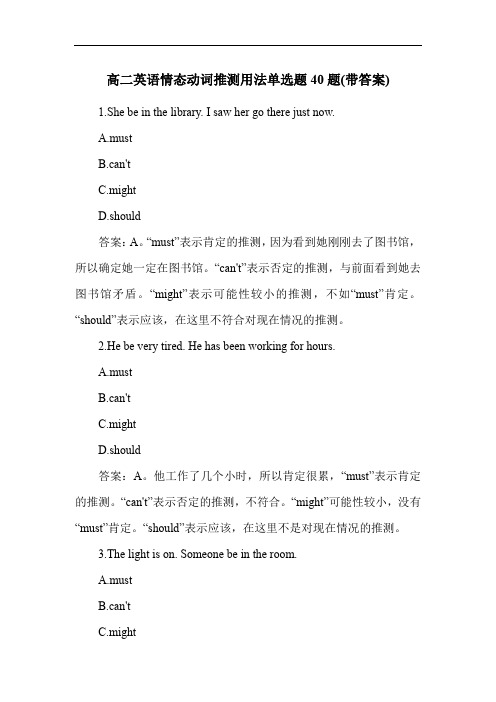
高二英语情态动词推测用法单选题40题(带答案)1.She be in the library. I saw her go there just now.A.mustB.can'tC.mightD.should答案:A。
“must”表示肯定的推测,因为看到她刚刚去了图书馆,所以确定她一定在图书馆。
“can't”表示否定的推测,与前面看到她去图书馆矛盾。
“might”表示可能性较小的推测,不如“must”肯定。
“should”表示应该,在这里不符合对现在情况的推测。
2.He be very tired. He has been working for hours.A.mustB.can'tC.mightD.should答案:A。
他工作了几个小时,所以肯定很累,“must”表示肯定的推测。
“can't”表示否定的推测,不符合。
“might”可能性较小,没有“must”肯定。
“should”表示应该,在这里不是对现在情况的推测。
3.The light is on. Someone be in the room.A.mustB.can'tC.mightD.should答案:A。
灯亮着,所以肯定有人在房间里,“must”表示肯定的推测。
“can't”表示否定的推测,与灯亮着矛盾。
“might”可能性较小,不如“must”肯定。
“should”表示应该,不是对现在情况的推测。
4.She be at home. I just called and no one answered.A.mustB.can'tC.mightD.should答案:B。
刚刚打电话没人接,所以肯定不在家,“can't”表示否定的推测。
“must”表示肯定的推测,不符合。
“might”可能性较小,这里根据打电话没人接可以确定不在家。
“should”表示应该,不是对现在情况的推测。
高考英语情态动词推测单选题20题
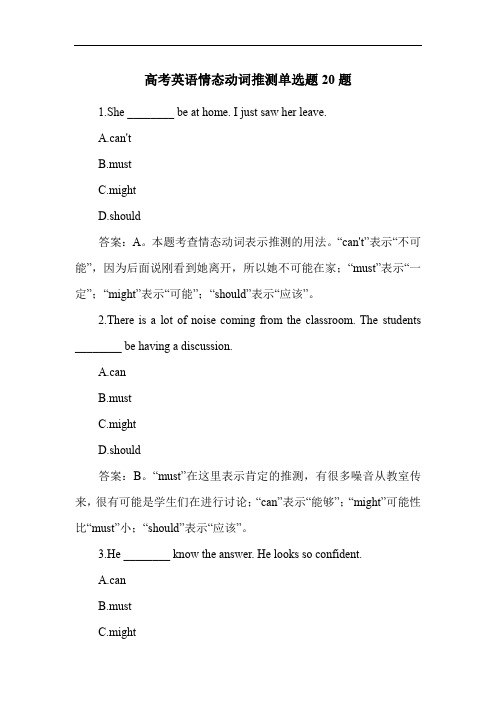
高考英语情态动词推测单选题20题1.She ________ be at home. I just saw her leave.A.can'tB.mustC.mightD.should答案:A。
本题考查情态动词表示推测的用法。
“can't”表示“不可能”,因为后面说刚看到她离开,所以她不可能在家;“must”表示“一定”;“might”表示“可能”;“should”表示“应该”。
2.There is a lot of noise coming from the classroom. The students ________ be having a discussion.A.canB.mustC.mightD.should答案:B。
“must”在这里表示肯定的推测,有很多噪音从教室传来,很有可能是学生们在进行讨论;“can”表示“能够”;“might”可能性比“must”小;“should”表示“应该”。
3.He ________ know the answer. He looks so confident.A.canB.mustC.might答案:B。
从他看起来很自信可以推断他一定知道答案,“must”表示肯定的推测;“can”表示“能够”;“might”表示不太确定的推测;“should”表示“应该”。
4.The book isn't here. She ________ have taken it.A.canB.mustC.mightD.should答案:C。
书不在这儿,她有可能拿走了,“might”表示不太确定的推测;“can”表示“能够”;“must”表示很肯定的推测,不太符合这里的语境;“should”表示“应该”。
5.They ________ be late. The traffic is very heavy.A.canB.mustC.mightD.should答案:C。
(完整版)情态动词表推测专项练习题
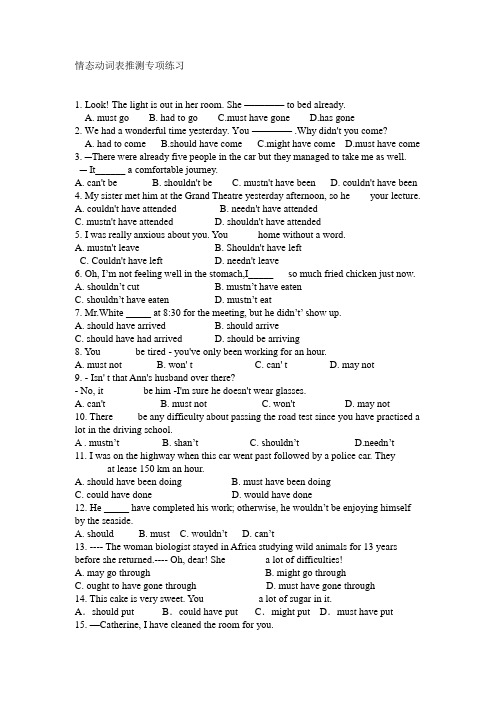
情态动词表推测专项练习1. Look! The light is out in her room. She ———— to bed already.A. must goB. had to goC.must have goneD.has gone2. We had a wonderful time yesterday. You ———— .Why didn't you come?A. had to comeB.should have comeC.might have comeD.must have come3. ─There were already five people in the car but they managed to take me as well.─ It______ a comfortable journey.A. can't beB. shouldn't beC. mustn't have beenD. couldn't have been4. My sister met him at the Grand Theatre yesterday afternoon, so he ___ your lecture.A. couldn't have attendedB. needn't have attendedC. mustn't have attendedD. shouldn't have attended5. I was really anxious about you. You _____ home without a word.A. mustn't leaveB. Shouldn't have leftC. Couldn't have leftD. needn't leave6. Oh, I’m not feeling well in the stomach,I_____ so much fried chicken just now.A. shouldn’t cutB. mustn’t have eatenC. shouldn’t have eatenD. mustn’t eat7. Mr.White _____ at 8:30 for the meeting, but he didn’t’ show up.A. should have arrivedB. should arriveC. should have had arrivedD. should be arriving8. You ______ be tired - you've only been working for an hour.A. must notB. won' tC. can' tD. may not9. - Isn' t that Ann's husband over there?- No, it _______ be him -I'm sure he doesn't wear glasses.A. can'tB. must notC. won'tD. may not10. There ____ be any difficulty about passing the road test since you have practised a lot in the driving school.A . mustn’t B. shan’t C. shouldn’t D.needn’t11. I was on the highway when this car went past followed by a police car. They______ at lease 150 km an hour.A. should have been doingB. must have been doingC. could have doneD. would have done12. He _____ have completed his work; otherwise, he wouldn’t be enjoying himself by the seaside.A. shouldB. mustC. wouldn’tD. can’t13. ---- The woman biologist stayed in Africa studying wild animals for 13 years before she returned.---- Oh, dear! She _______ a lot of difficulties!A. may go throughB. might go throughC. ought to have gone throughD. must have gone through14. This cake is very sweet. You __________ a lot of sugar in it.A.should put B.could have put C.might put D.must have put15. —Catherine, I have cleaned the room for you.—Thanks. You it. I could manage it myself.A.needn’t do B.needn’t have done C.mustn’t do D.shouldn’t have done 16.—Tom is never late for work. Why is he absent today?—Something ________ to him.A.must happen B.should have happenedC.could have happened D.must have happenedThe Uniqueness of Finger-prints(指纹的唯一性)难度:****词数:266 标准时间:6分钟完成时间:______正确数:______ Every human being has a unique①arrangement of the skin on his fingers and this arrangement is unchangeable. Scientists and experts have proved the uniqueness of finger-prints and discovered that no exactly similar pattern is passed on from parents to children, though nobody knows why this is the case.The ridge structure on a person’s fingers does not change with growth and is not affected by surface injuries. Burns, cuts and other damage to the outer part of the skin will be replaced in time by new one, which bears a reproduction of the original②pattern. It is only when the inner skin is injured that the arrangement will be destroyed. Some criminals make use of this fact to remove their own finger-prints but this is a dangerous and rare step to take.Finger-prints can be made very easily with printer’s ink. They can by recorded easily. With special methods, identification③can be achieved successfully within a short time. Because of the simplicity and economy of this system, finger-prints have often been used as a method of solving criminal case. A suspected man may deny a charge but this may be in vain. His finger-prints can prove who he is even if his appearance has been changed by age or accident.When a suspect leaves finger-prints behind at the scene of a crime, they are difficult to detect with the naked eye. Special techniques are used to “develop” them. Some of the marks found are incomplete but identification is possible if a print of a quarter of an inch square can be obtained. ( ) 1. Scientists and experts have proved that the pattern of a human being’s finger skin ________.A. is similar to his mother’sB. is valuable to himself onlyC. is like that of others with the same type of bloodD. is different from that of all others( ) 2. If your fingers are wounded by knife, fire or other means, the structure of skin will ________.A. be changed partlyB. be replaced by a different oneC. be the same when the wound is recoveredD. become ugly( ) 3. Some criminals remove their own finger-prints by ________.A. using printer’s inkB. injuring the inner skinC. damaging the outer skinD. damaging the colour( ) 4. Finger-prints have often been used as a method of solving criminal case because it ________.A. is complicated but reliableB. is simple and not expensiveC. is expensive but easy to doD. can bring a lot of money。
人教版九年级英语 Unit 8 情态动词(表示推测)练习题

Unit 8 情态动词(表示推测)一、单项选择。
( ) 1. You are not allowed to play with fire in the forest. It ________kill plants, animals and even people.A. mightB. might notC. shouldD. should not ( ) 2. --- Whose textbook is it? Is it Jenny`s ?--- No, it ________ be Jenny`s. Look, Helen`s name is on the cover. I think it________ be Helen`s.A. can`t; mustB. mustn`t; mustC. can`t; mayD. mustn`t; may( ) 3. --- Is the girl over there Amy?--- It ________ be her. She has gone to Beijing to visit her grandma.A. mustn`tB. can`tC. couldD. might( ) 4. --- It`s said that nuclear power will be used to produce electricityin Xianning.--- However, nuclear power ________ be very dangerous.A. canB. needC. shallD. can`t( ) 5. --- According to the school rules, the students ________ get theirears pierced.--- I think that`s right. Students should pay more attention totheir study.A. mustn`tB. canC. needn`tD. should( ) 6. Life ________ be easy or difficult, sometimes it depends on how you look at it.A. can`tB. mustC. can( ) 7. The man in my room ________ be my brother. He is still in France.A. couldn`tB. mustn`tC. needn`tD. can`t( ) 8. --- Whose dictionary is this?--- It ________ be Jeff`s. Look! His name is on Page One.A. mustB. needC. can`t( ) 9. --- You ________ take photos here! Look at the sign. It says“No photos”--- Sorry, I won`t.A. mustB. needC. mustn`tD. needn`t( ) 10. People ________ talk on a mobile phone while they are driving.A. shouln`tB. needn`tC. mustD. can( ) 11. My classmate is running so fast! I ________ believe my eyes.A. can`tB. needn`tC. mustn`tD. shouldn`t( ) 12. There`s no light on--they ________ be at home.A. can`tB. mustn`tC. needn`tD. shouldn`t( ) 13. ________ you smell something burning? Go and seewhat`s happening.A. CanB. MayC. MustD. Need( ) 14. --- Look! People outside are wearing thick coats.--- The weather ________ be very cold.A. mightB. mustC. can`t( ) 15. --- Allen, shall we go to the bookstore this afternoon?--- I`m sorry, David, but I ________ meet my cousin at the train station.A. have toB. canC. mayD. could( ) 16. Only plants and animals that need very little water ________ live in a desert.A. canB. needC. must( ) 17. According to the traffic law, children under 12 ________ride bicycles on the road.A. won`tB. wouldn`tC. needn`tD. mustn`t( ) 18. We ________ follow the traffic rules when crossing the street.A. mustB. mayC. canD. need( ) 19. --- Who`s playing the piano in the classroom? Is that Jason?--- It ________ be Jason. He exercise in the gym at this time every day.A. mightB. mustC. can`t( ) 20. What an amazing robot! It ________ cook more than 5000 dishes.A. shallB. needC. mustD. can( ) 21. --- Sam, ________ I join you in the community service?--- Of course you can.A. canB. mustC. shouldD. need( ) 22. --- How long can I keep these books?--- According to the library rules, you ________ return them within 7 days.A. mustB. mightC. could( ) 23. --- Where is Jeff now?--- I`m not sure. He ________ be playing basketball in theplayground.A. can`tB. mightC. must( ) 24. --- In China, many students feel stressed because of toomuch homework.--- Don`t worry. Our government has realized this problem. I`m sure there ________ be good news for them soon.A. canB. mustC. shouldD. need( ) 25. --- Sandy, is Mr. Li in the teachers` office now?--- I am not sure. He ________ be there.A. mustB. can`tC. mustn`tD. may( ) 26. --- Where`s your father?--- I`m not sure. He ________ be in the kitchen.A. couldB. canC. needD. must( ) 27. --- What will the weather be like tomorrow?--- It ________ be windy or rainy. It always changes quickly.A. mustB. mightC. can`tD. shouldn`t( ) 28. --- Will Shirly come to our group discussion tomorrow?--- It`s hard to say. She may come, or she ________ .A. can`tB. needn`tC. wouldn`tD. mustn`t( ) 29. --- What a big box! What`s in it?--- It smells so delicious! It ________ be some food.A. mayB. shallC. willD. need二、用适当的情态动词填空。
高考英语情态动词推测运用单选题20题
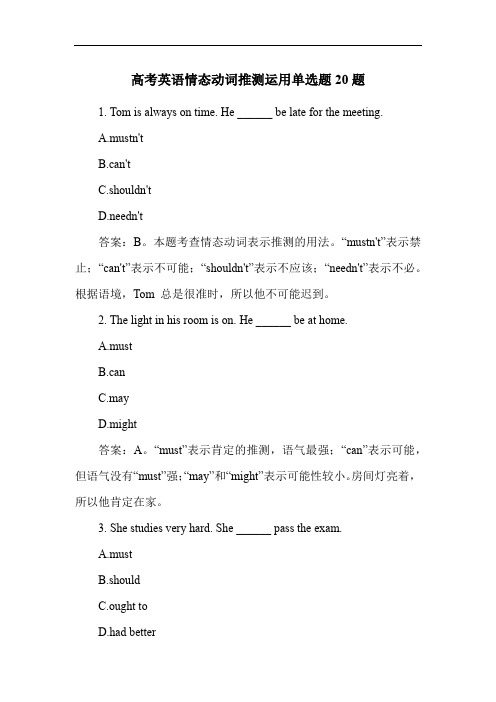
高考英语情态动词推测运用单选题20题1. Tom is always on time. He ______ be late for the meeting.A.mustn'tB.can'tC.shouldn'tD.needn't答案:B。
本题考查情态动词表示推测的用法。
“mustn't”表示禁止;“can't”表示不可能;“shouldn't”表示不应该;“needn't”表示不必。
根据语境,Tom 总是很准时,所以他不可能迟到。
2. The light in his room is on. He ______ be at home.A.mustB.canC.mayD.might答案:A。
“must”表示肯定的推测,语气最强;“can”表示可能,但语气没有“must”强;“may”和“might”表示可能性较小。
房间灯亮着,所以他肯定在家。
3. She studies very hard. She ______ pass the exam.A.mustB.shouldC.ought toD.had better答案:A。
“must”表示肯定的推测,根据她学习很努力这个前提,可以推测她肯定能通过考试。
“should”表示应该;“ought to”表示应该;“had better”表示最好。
4. The ground is wet. It ______ have rained last night.A.mustB.shouldC.ought toD.can答案:A。
地面湿了,说明昨晚肯定下雨了。
“must”表示肯定的推测,语气最强。
“should”“ought to”表示应该;“can”表示可能,但语气较弱。
5. There is a lot of noise coming from their room. They ______ be having a party.A.mustB.canC.mayD.might答案:A。
情态动词表推测练习试题附答案
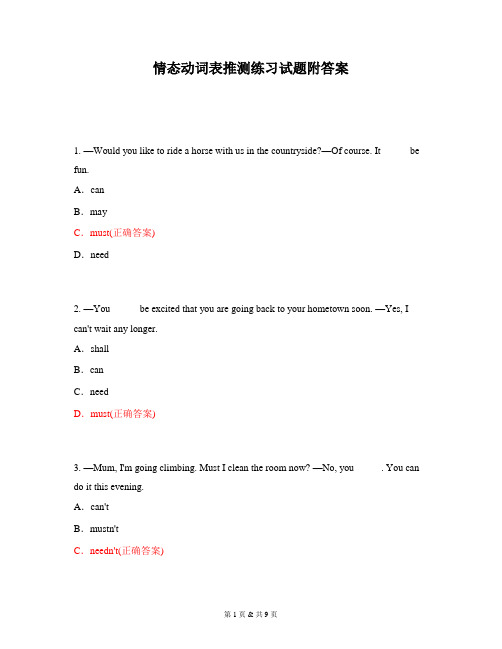
情态动词表推测练习试题附答案1. —Would you like to ride a horse with us in the countryside?—Of course. It _____ be fun.A.canB.mayC.must(正确答案)D.need2. —You _____ be excited that you are going back to your hometown soon. —Yes, I can't wait any longer.A.shallB.canC.needD.must(正确答案)3. —Mum, I'm going climbing. Must I clean the room now? —No, you _____. You can do it this evening.A.can'tB.mustn'tC.needn't(正确答案)4. —That man must be Sarah's husband.—No, he____ be her husband. She is still single. A.can't(正确答案)B.mustn'tC.may notD.ought to5. —Isn't that Ann's husband over there?—No, it _____ be him—I'm sure he doesn't wear glasses.A.can't(正确答案)B.must notC.won'tD.may not6. —Is Mr. Hu in the reading room?—No, he _____ be there. He has gone to Tianjin. A.mustn'tB.needn'tC.won'tD.can't(正确答案)7. —Whose T-shirt is this?—It _____ be John's. It's much too small for him.A.canB.mayC.can't(正确答案)D.must8. —Where is our English teacher? Has she left?—She __ be away. Her keys are still here.A.can't(正确答案)B.won'tC.mustD.might9. —Look at the boy running on the ground. Is it Davis? —It _____ be him. I saw him go to the teacher's office just now.A.mustn'tB.can't(正确答案)C.couldD.might10. —Is there a movie on in the cinema tonight?—There _____ be. I will phone the cinema and find it out.A.might(正确答案)B.shouldC.canD.could11. —Where is Mrs Zhao?—I'm not sure. She _____ be in the library. A.mustB.canC.might(正确答案)D.should12. When winter comes, _____ spring be far behind?A.shouldB.needC.mustD.can(正确答案)13. Peter _____ come with us tonight, but he isn't very sure.A.mustB.may(正确答案)C.canD.will14. David, you mustn't play with the valuable bottle, you _____ break it. A.can'tB.may(正确答案)D.shouldn't15. I thought you _____ like something to read. So I have brought you some books. A.oughtB.might(正确答案)C.couldD.must16. Class 3 won the football match! _____ it be true?A.MayB.MustC.WillD.Can(正确答案)17. This book _____ Lucy's. Look! Her name is on the book cover.A.must be(正确答案)B.may beC.can't beD.mustn't be18. You have worked for a long time. You _____ be very tired.A.must(正确答案)C.couldD.mustn't19. The light in his room is still on, so he _____ be at home.A.can'tB.shouldC.must(正确答案)D.need20. You _____ be hungry after a long walk.A.shouldB.must(正确答案)C.needD.couldn't21. — Excuse me. Will you please tell me the way to the railway station? — Oh, sorry, but I don’t know. You ______ go and ask that policeman.A. may(正确答案)B. mustC. would22. John ______ come to see us tonight, but he isn’t very sure yet.A. may(正确答案)B. canC. has toD. must23. This book ______ Lucy’s. Look! Her name is on the book’s cover.A. can’t beB. may beC. mustn’t beD. must be(正确答案)24. ______ I finish the work today? — No, you ______.A. Must, can’tB. Must, needn’t(正确答案)C. May, needn’tD. Can, mustn’t25. ______ we ask you some questions? — Sure, go ahead!A. WillB. Shall(正确答案)C. Must26. You must come back every month. — Yes, I ______.A. mustB. shouldC. will(正确答案)D. can27. Where is Tom? — He hasn’t come to school today. I think he ______ be ill.A. has toB. had betterC. canD. must(正确答案)28. What’s the time now? —It’s still early. You ______ worry about the time.A. may notB. don’t have to(正确答案)C. can’tD. don’t need29. ______ I visit Lucy on Sunday, Mum? — Yes, you ______.A. Must, canB. May, may(正确答案)C. Need, needD. May, need30. Computers ______ do many things for us..A. can(正确答案)B. mustC. shouldD. need。
高考英语情态动词推测单选题20题
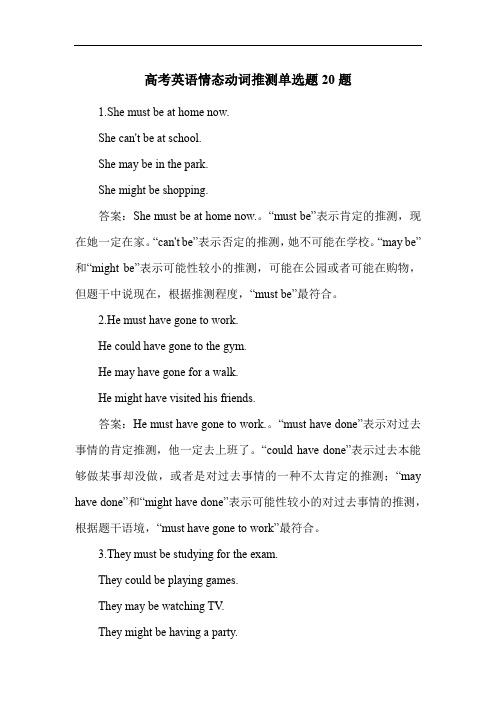
高考英语情态动词推测单选题20题1.She must be at home now.She can't be at school.She may be in the park.She might be shopping.答案:She must be at home now.。
“must be”表示肯定的推测,现在她一定在家。
“can't be”表示否定的推测,她不可能在学校。
“may be”和“might be”表示可能性较小的推测,可能在公园或者可能在购物,但题干中说现在,根据推测程度,“must be”最符合。
2.He must have gone to work.He could have gone to the gym.He may have gone for a walk.He might have visited his friends.答案:He must have gone to work.。
“must have done”表示对过去事情的肯定推测,他一定去上班了。
“could have done”表示过去本能够做某事却没做,或者是对过去事情的一种不太肯定的推测;“may have done”和“might have done”表示可能性较小的对过去事情的推测,根据题干语境,“must have gone to work”最符合。
3.They must be studying for the exam.They could be playing games.They may be watching TV.They might be having a party.答案:They must be studying for the exam.。
“must be doing”表示对现在正在进行事情的肯定推测,他们一定在为考试学习。
“could be doing”表示现在可能在做某事但不太确定;“may be doing”和“might be doing”表示可能性较小的现在正在进行的事情的推测,结合语境,“must be studying for the exam”更符合。
二年级英文试题练习用适当的情态动词表达推测

二年级英文试题练习用适当的情态动词表达推测英语试题练习:用适当的情态动词表达推测1. Choose the most suitable modal verb to express speculation in the following sentences:(选择最合适的情态动词来表达以下句子中的推测)a) John isn't at home. He _____ at the park.b) The phone is ringing. It _____ be Anna calling.c) Lucy looks tired. She _____ have stayed up late last night.2. Rewrite the following sentences using appropriate modal verbs to express speculation:(使用适当的情态动词进行推测,重新书写以下句子)a) It's possible that David forgot his homework.b) It's likely that Sarah went to the store.c) It's probable that Mark will win the race.3. Fill in the blanks with suitable modal verbs to express speculation:(填入适当的情态动词以表达推测)a) The weather looks cloudy. It ____ rain later.b) The dog is barking loudly. It ____ see something outside.c) The movie starts at 7 PM. We ____ get there on time.4. Choose the correct modal verb to complete the sentences:(选择正确的情态动词完成句子)a) She _____ be the new teacher. She is very friendly.b) They _____ be lost. They're looking at a map.c) He _____ be waiting for us. Let's go and check.5. Rewrite the sentences using modal verbs to express different levels of possibility:(使用情态动词重写句子,表达不同的可能性程度)a) It is possible that Peter won the competition.b) It is likely that Sarah will pass the exam.c) It is probable that the train is delayed.6. Use modal verbs to express speculation in the following sentences:(使用情态动词推测以下句子)a) The package is very heavy. It ____ contain books.b) The door is open. Someone _____ have forgotten to close it.c) The car is parked outside. Maybe they _____ have gone to the mall.7. Fill in the blanks with suitable modal verbs to express speculation:(填入适当的情态动词以表达推测)a) Andrew has been studying all night. He ____ be tired.b) The phone is ringing. It ____ be Jane calling.c) The children are laughing. They ____ be watching a funny movie.将会根据内容需求来书写以上试题练习。
- 1、下载文档前请自行甄别文档内容的完整性,平台不提供额外的编辑、内容补充、找答案等附加服务。
- 2、"仅部分预览"的文档,不可在线预览部分如存在完整性等问题,可反馈申请退款(可完整预览的文档不适用该条件!)。
- 3、如文档侵犯您的权益,请联系客服反馈,我们会尽快为您处理(人工客服工作时间:9:00-18:30)。
1. Look! The light is out in her room. She ———— to bed already.A. must goB. had to goC.must have goneD.has gone2. ─There were already five people in the car but they managed to take me as well.─ It______ a comfortable journey.A. can't beB. shouldn't beC. mustn't have beenD. couldn't have been3. My sister met him at the Grand Theatre yesterday afternoon, so he ___ your lecture.A. couldn't have attendedB. needn't have attendedC. mustn't have attendedD. shouldn't have attended4. You ______ be tired - you've only been working for an hour.A. must notB. won' tC. can' tD. may not5. - Isn' t that Ann's husband over there?- No, it _______ be him -I'm sure he doesn't wear glasses.A. can'tB. must notC. won'tD. may not6. I was on the highway when this car went past followed by a police car. They______ at lease 150 km an hour.A. should have been doingB. must have been doingC. could have doneD. would have done7. He _____ have completed his work; otherwise, he wouldn’t be enjoying himself by the seaside.A. shouldB. mustC. wouldn’tD. can’t8. This cake is very sweet. You __________ a lot of sugar in it.A.should put B.could have put C.might put D.must have put 9.—Tom is never late for work. Why is he absent today?—Something ________ to him.A.must happen B.should have happenedC.could have happened D.must have happened情态动词must, can, could, may, might 表推测的用法情态动词中的must, can, could, may, might都表推测。
其中must的可能性最大,can / could次之,may / might最小。
具体用法如下:1.must的用法(1)表示推测“可能性”时,意思是“一定、准是”,语气较肯定,较有把握He must be American. = It is certain that he is American. 他准是个美国人。
(2)must表推测只能用于肯定句。
如果要表示“一定不、肯定不”的意思时,应用can`t,如询问某种可能时,应用can。
He must know my address. 他肯定知道我的地址。
(一定)He can`t know my address. 他肯定不知道我的地址。
(一定不)Can he know my address? 他知道我的地址吗?(询问可能性)(3)must表示推测时,可以推测现在/正在发生的动作/过去发生的动作。
He must have a car now. (现在)他一定有辆小汽车。
He must be doing his exercises in the classroom.(正在进行)他一定在教室里做练习。
He must have finished the work.(过去发生)他一定已完成了工作。
注:must表示推测时很少用于将来的情况。
一般不用He must come tomorrow.可用It`s certain / I`m sure that he will come tomorrow.(4)在反意疑问句中,当附属部分含有表示推测意义的must时,疑问部分的助动词应与must后面的动词在非推测情况下的用法保持一致。
He must be a worker, isn`t he? (现在)他准时个工人,是吗?It must have rained last night, didn`t it? (过去)昨晚一定下雨了,是不是?You must have learned English for many years, haven`t you? (完成时)你一定学了好多年英语,是吗?2.can / could的用法(1)can表示推测“可能性”时,往往用于否定句或疑问句。
Can`t“一定不”,语气很肯定。
can在疑问句中意思是“会、可能”。
He can`t be at home. = It is impossible that he is at home. 他一定不在家。
(2)can /can`t后可接进行时/完成时,表示对现在发生的动作或过去发生的动作进行推测。
They can`t be reading in the library. 他们一定不在图书馆读书。
He can`t have gone to Shanghai for I saw him a minute ago.他不可能去了上海,我刚才还看见他。
It`s so late. Where can she have gone? 天晚了,她可能去哪儿了呢?(3)在反意疑问句中,当陈述部分含有表示推测意义的can`t时,疑问部分的助动词应与can`t后面的动词在非推测情况下的用法保持一致.He can`t be a teacher, is he? 他不是教师,是吗?She can`t have finished her homework, has she?她一定没有完成家庭作业,是不是?(4)could可用于表示某事有可能发生或可能是事实。
Don`t eat it. It could be poisonous. 不要吃它,可能有毒。
The plane could be delayed by fog. 飞机可能会因为雾晚点。
(5)could还可以用于表示客气、委婉、礼貌的请求语气。
Excuse me, could you tell me the way to the bus station?Could you help me?(6)couldn`t表示否定推测,表示某事不可能真实,或由于特定事实或环境某事肯定不会发生。
It couldn`t possibly be poison. 这不可能是毒药。
注:有时与形容词的比较级连用强调某人或某物不可能再更多地具有某种属性You couldn`t be more wrong. 你真是大错特错。
I couldn`t be happier. 我简直是幸福极了。
3.may和might的用法(1)may, might表示推测“可能性”时,意思是“可能”、“也许”,语气没有 must肯定。
He may / might be American. = It is possible that he is American.他可能是个美国人。
注:might不表示过去时态,只是语气上比may更委婉,表示的可能性更小。
(2)may, might表推测时,可以用于否定句,意思是“可能不、也许不”,但不用于疑问句。
He may / might not be at home. 他也许不在家。
(3)may, might可以推测现在正在发生的动作或过去发生的动作。
He may / might be sleeping now. (现在)他可能正在睡觉。
The boy may / might not be watching TV at home. (现在)这个男孩可能没在家看电视These students may / might have seen the film before.(过去)这些学生以前可能看过这部电影。
(4)may, might还可以推测将来的情况。
I think we should take raincoat with us, it may rain.我想我们应该带上雨衣,可能要下雨了。
She might not come this afternoon. 她今天下午可能不来。
